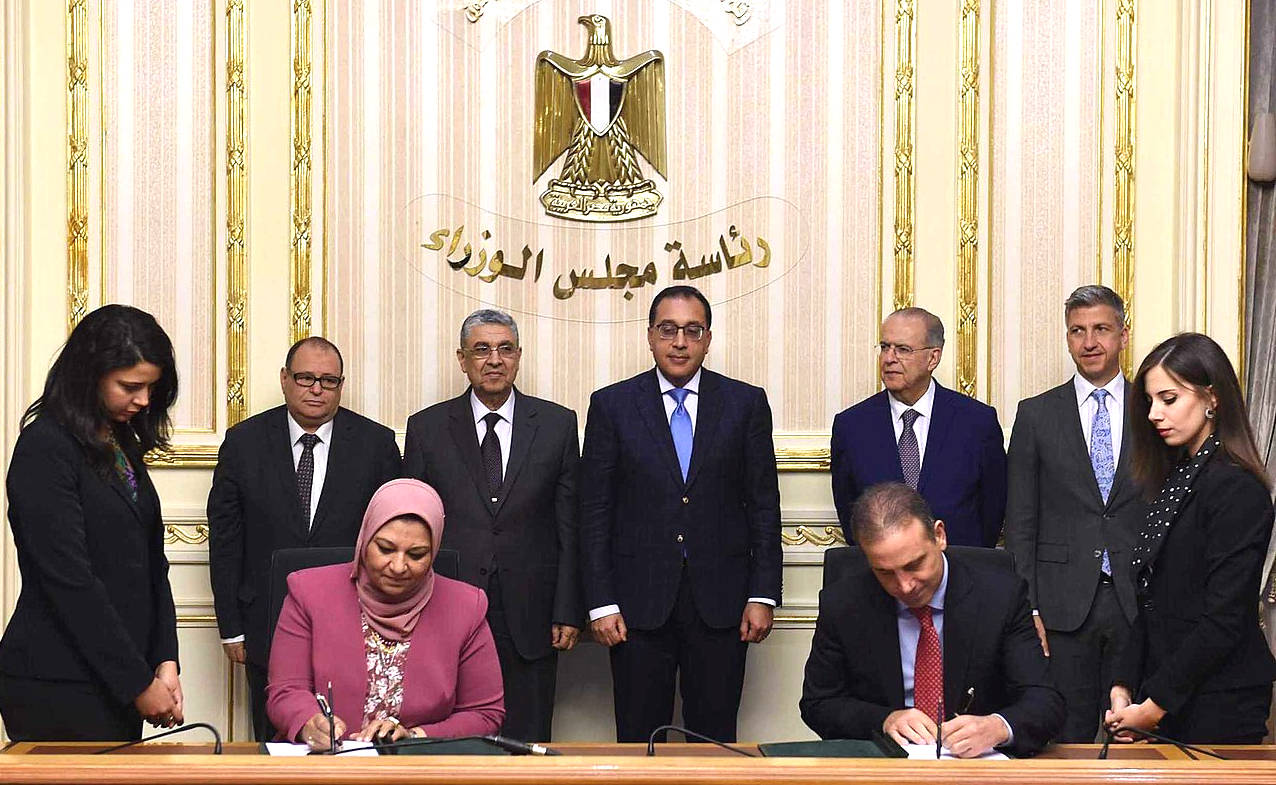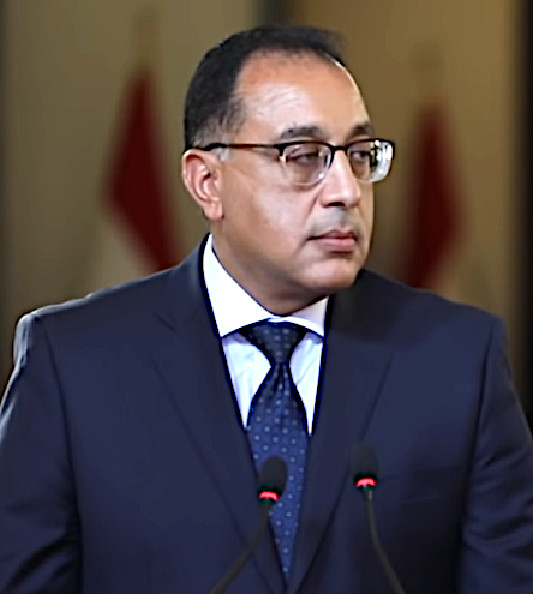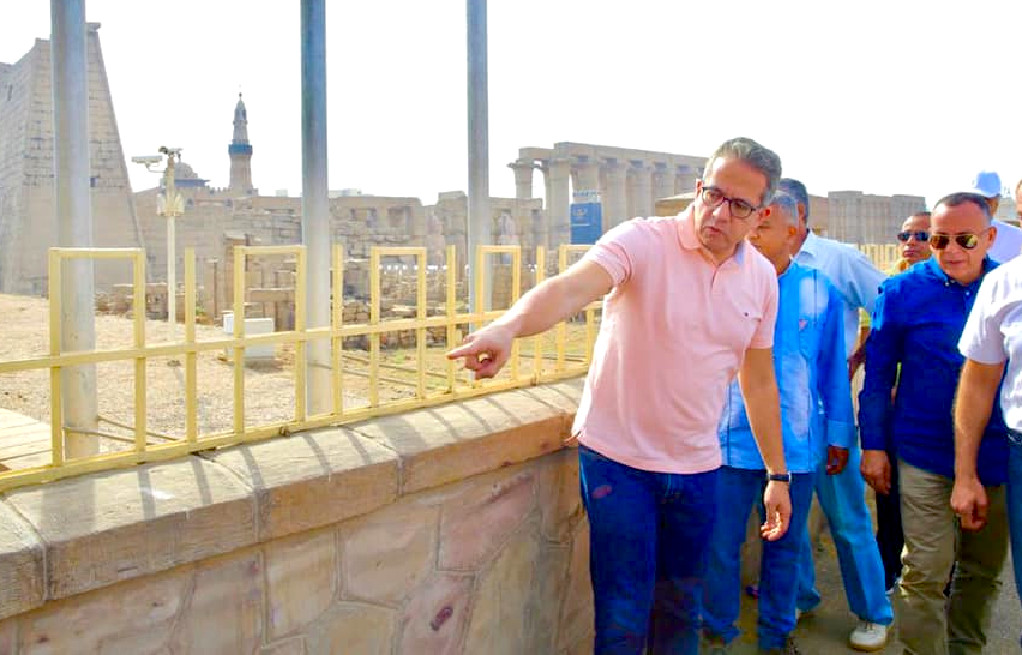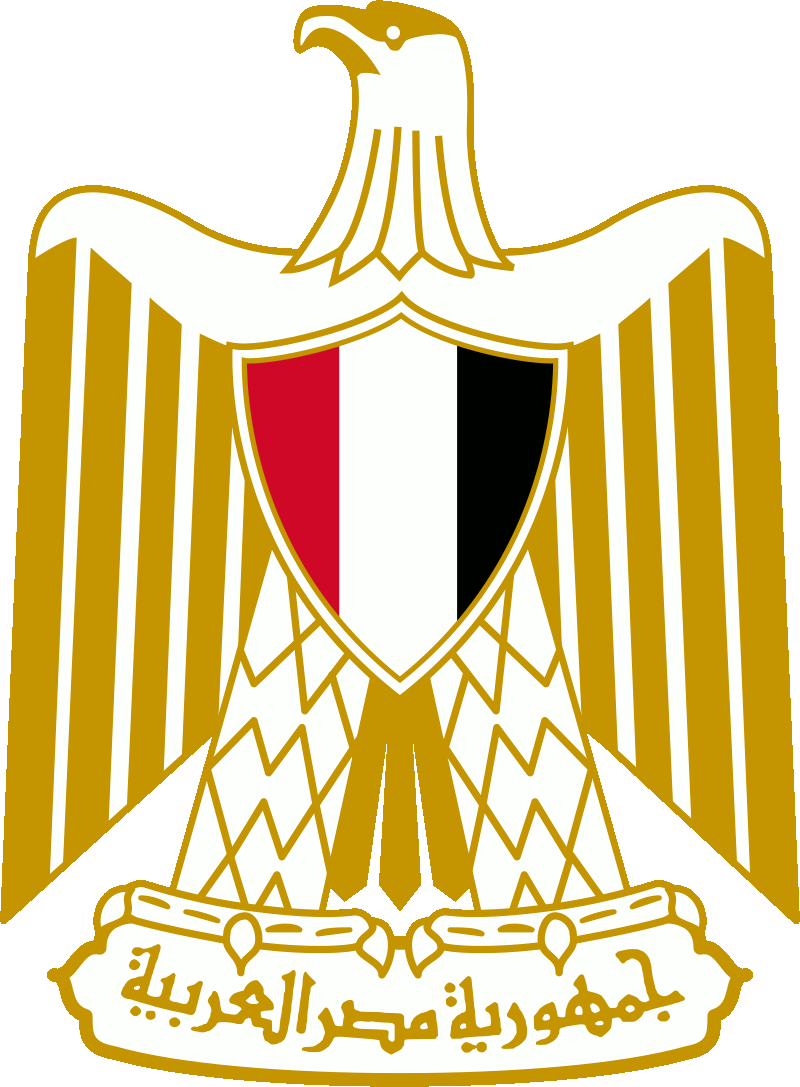|

From 1 March to 17 June 2014, Ibrahim Mahlab served as the Acting Prime Minister of Egypt. At the time of his appointment by Adly Mansour, he said, "security and stability in the entire country and crushing terrorism will pave the way for investment." A new cabinet was formed on 19 September 2015.
Egyptian President Abdel-Fattah
El-Sisi accepted the resignation of the government and asked Petroleum Minister Sherif Ismail to form a new cabinet.
In June 2018, Ismail submitted his letter of resignation to Sisi. Soon afterwards, Sisi appointed Housing Minister Mostafa Madbouly as acting prime minister.

Guardian
of the archaeological wonders of Ancient Egypt. Renewables
could play a big part in generating zero emission tours,
hence, climate friendly tourism, to bolster income, which in
turn might be used to further the protections of
antiquities, that nobody wants to see looted, rather stolen
items returned to Egypt, as part of the encapsulation of the
Land of the Pharaohs.
Egypt has a long history with a prime minister-type position existing in its governance. Under various Islamic Empires, Egypt had Viziers, a political office similar in authority and structure (in terms of being second in command to the Head of State) to that of a prime minister. During the Old, Middle, and New Kingdom phases of Ancient Egypt, it was common practice for the Pharaoh to appoint a second in command officer whose position is translated to as Vizier. This pattern of having a prime minister/vizier position in government was only broken for an extended period of time during Roman and Sassanid governance of Egypt, in which Egypt was directly ruled by appointed Governors. Then with the founding of modern Egypt and the advent of the Muhammad Ali dynasty, premiership and cabinets in their current definitions started appearing in Egypt parallel to the country's first modern constitutions and parliaments. The office of Prime Minister of Egypt was established in 1878 during the reign of Khedive Ismail, along with the Cabinet of Egypt. After the abolition of the monarchy in 1953, the Egyptian government maintained the position of prime-minister.
In the late 1970s, Egypt had several cohabitation governments which proved to be unstable, due to the struggle arising between the president and the prime minister. From 1981 until 2011, the National Democratic Party had maintained a majority in the People's Assembly and supplied the Egyptian president. The National Democratic Party was dissolved by the supreme administrative court on 16 April 2011, following the Egyptian uprising which eventually caused the resignation of Hosni Mubarak
Previously, under the 1971 Constitution as amended on 1980, 2003 and 2007, the role of the Prime Minister was limited only to supervising the Cabinet, as the President at that time, was both the head of state and of the government.
The prime minister, now, heads the Cabinet, and the entire government of the country under the 2012 and the present 2014 Constitutions, aside from supervising and directing its activities and overseeing its work. The prime minister, alongside the members of the Cabinet, may propose laws to unicameral Parliament, the House of Representatives, as well as amendments during parliamentary meetings. The prime minister has also the power to issue regulations enforcing the laws as well as ensuring full public services and disciplinary measures, which must be subject to government approval.
The said regulatory powers were previously held by the president under the 1971 Constitution, as amended on 1980, 2003 and 2007.
The prime minister and the Cabinet also helps the president in formulating the state's general policy and in overseeing its implementation under both the 2012 and the present 2014 Constitutions.
Nubar Pasha was a Christian Egyptian-Armenian politician and the first Prime Minister of Egypt. He served as Prime Minister three times during his career. His first term was between August 1878 and 23 February 1879
When parties from opposite ends of the political spectrum control Parliament and the presidency, the power-sharing arrangement is known as cohabitation. Several cohabitation governments took control in the 1970s yet proved to be very unstable.


THE CABINET
The Cabinet of Egypt is the chief executive body of the Arab Republic of Egypt. It consists of the Prime Minister and the cabinet ministers.
The government has a leading role in shaping the agenda of the houses of Parliament. It may propose laws to Parliament, as well as amendments during parliamentary meetings. It may make use of some procedures to speed up parliamentary deliberations. The government is responsible only to Parliament, specifically the People's Assembly.
The People's Assembly may pass a motion of censure, forcing the resignation of the cabinet. Ministers have to answer questions from Members of Parliament, both written and oral; this is known as Inquiries to the Government Talebat Ihata.
In addition, ministers attend meetings of the two houses of Parliament when laws pertaining to their areas of responsibility are being discussed.
The details of the cabinet's organisation are set down in articles 153 to 160 of the constitution. Article 155 states that the members of the cabinet have to be sworn in when taking office.
The cabinet of Egyptian Prime Minister Sherif Ismail was sworn in on 19 September 2015. On June 5, 2018, every member of the Egyptian Cabinet submitted their letter of resignation, but would remain in caretaker capacity until a new cabinet is appointed. On June 7, 2018, the Minister of Housing and Urban Utilities Mostafa Madbouly was appointed to succeed Ismail. It was also reported the new government had dropped eight cabinet Ministers, including Minister of Antiquities Khaled Al-Anany, Minister of Manpower Mohamed Saafan, Minister of Irrigation Mohamed Abdel Aty, Minister of Health Ahmed Emaddin, Minister of Agriculture Abdel Moniem al-Banna, and Minister of Higher Education Khaled Abdel
Ghaffa.
The proposed Cabinet has been accepted by the Egyptian Parliament. The final list of candidates for ministerial posts in the Madbouly government was published on June 10, 2018 and includes Assem El-Gazar as minister of housing; Hala Zayed as minister of health; Yasmeen Fouad as minister of environment; Mohamed Eissa as minister of manpower; Amr Nassar as minister of trade and industry; Magdy Abo El-Ela as minister of justice, Hala El-Khatib or Ashraf Sobhy as minister of youth and sports; Mahmoud Shaarawy as minister of state for local development; and Mohamed Moiet as new minister of finance. Eight women will serve as ministers of investment, planning, health, environment, social solidarity, immigration, tourism, and culture and the following ministers of Ismail's cabinet will remain in their positions: the ministers of petroleum, transportation, education, higher education, foreign affairs, interior, defence, military production, tourism, and parliamentary affairs
On June 13, it was reported that Madbouly had selected 13 to 16 deputy ministers and that the new government would be sworn in on June 14. On June 14, a new government consisting of 12 new ministers and 15 new deputy ministers was sworn in by Sisi. Madbouly was also sworn in as Prime Minister and will retain his role as Housing Minister as well. It was reported that his government would issue its policy statement on June 23. but parliamentary spokesman Salah Hassaballah later confirmed this to be incorrect. On June 23, Hassaballah stated that while no date was now scheduled to present the policy statement before Parliament, he expected the Madbouly government to present it in the next week and that the government was unable to prepare it in time for the planned date. Madbouly delivered his policy statement before the parliament on July 3.
The House of Representatives, the only legislative body in Egypt's unicameral parliament, afterwards referred the matter to a special committee chaired by first deputy speaker Al-Sayed Al-Sherif, which completed its review of the statement recommended a vote of confidence. Following weeks of debate, the House approved Madbouly's Cabinet in a vote of confidence on July 25.
CABINET
MEMBERS 2022
Prime Minister Mostafa Madbouly www.cabinet.gov.eg
Minister of Defence Mohamed Ahmed Zaki www.mod.gov.eg
Minister of Investment and International Cooperation Rania Al-Mashat www.moic.gov.eg
Minister of Education Reda Hegazy www.moe.gov.eg
Minister of Higher Education and Scientific Research Mohamed Ayman Ashour mohesr.gov.eg
Minister of Interior Mahmoud Tawfik www.moi.gov.eg
Minister of Foreign Affairs Sameh Shoukry www.mfa.gov.eg
Minister of Finance Mohamed Maait www.mof.gov.eg
Minister of Environment Yasmine Fouad www.eeaa.gov.eg
Minister of Culture Neveen El Kelany www.moc.gov.eg
Minister of Legal and Parliamentary Affairs Alaa El Din Fouad
Minister of Justice Omar Marwan www.jp.gov.eg
Minister of Transportation Kamel el Wazir www.mot.gov.eg
Minister of Electricity and Energy Mohamed Shaker El-Markabi www.moree.gov.eg
Minister of Agriculture and Land Reclamation Al Sayyed Al Qusair www.agr-egypt.gov.eg
Minister of Communications and Information Technology Amr Talaat www.mcit.gov.eg
Minister of Petroleum Tareq el Molla www.petroleum.gov.eg
Minister of Water Resources and Irrigation Hany Soweilam www.mwri.gov.eg
Minister of Housing, Utilities and Urban Development Assem el Gazzar www.mhuc.gov.eg
Minister of Supply and Internal Trade Aly Al Moselhy www.msit.gov.eg
Minister of Manpower Hassan Mohamed Shehata www.manpower.gov.eg
Minister of Immigration and Expatriates Affairs Soha Nashed www.emigration.gov.eg
Minister of Religious Endowment (Awqaf) Mohamed Mukhtar Gomaa www.awkafonline.com
Minister of Health and Population Khaled Abdel Ghaffar www.mohp.gov.eg
Minister of Civil Aviation Mohamed Abbas Helmy www.civilaviation.gov.eg
Minister of Social Solidarity Nevine el Qabbaj www.moss.gov.eg
Minister of Planning and Economic Development Hala Helmy el-Said www.mped.gov.eg
Minister of Industry, Trade and Small Industries Ahmed Samir Saleh www.mti.gov.eg
Minister of Antiquities Ahmed Eissa www.antiquities.gov.eg
Minister of State for Youth and Sports Ashraf Sobhy youth.gov.eg
Minister of State for Military Production Mohamed Salah El Din www.momp.gov.eg
Minister of State for Local Development Hesham Amna mld.gov.eg
Minister of the Public Sector Mahmoud Esmat www.mpbs.gov.eg
BLUE
SHIELD STATEMENT ON EGYPT 31 JANUARY 2011
The Egyptian revolution took place following a popular uprising that began on January 25th 2011. The uprising was mainly a campaign of non-violent civil resistance, which featured a series of demonstrations, marches, acts of civil disobedience, and labour strikes. Millions of protesters from a variety of socio-economic and religious backgrounds demanded the overthrow of the regime of Egyptian President Hosni Mubarak.
Unfortunately, the revolution was not without violent clashes between security forces and protesters, with at least 800 people killed and thousands injured. The uprising took place in Cairo,
Alexandria, and in other cities in Egypt.
Following the recent events in Egypt, the Blue Shield expresses its great concern about the safeguarding of the country’s invaluable cultural heritage amid the existing turmoil.
Starting last Friday evening, a number of important museums and sites in Egypt have fallen prey to looters. Thankfully, in certain cases, it has been reported that members of civil society stood to protect museums and heritage sites all over the country. This demonstrates not only the attachment of the local population for their cultural heritage and their determination to protect it, but also the vulnerability of cultural institutions, sites and monuments during times of great conflict.

BLUE
SHIELD 2ND STATEMENT ON EGYPT 22 DECEMBER 2011
As the altercations in Egypt endure, and following the recent damages suffered by the Institut d'Egypte in Cairo, the Blue Shield expresses its great concern regarding the safeguarding of the country's invaluable cultural heritage amidst the ongoing turmoil, and wishes to recall the importance of the Arab Republic of Egypt as repository of the world's collective memory. The recent events in Cairo have given reason for new alarm. The Blue Shield and the world heritage community bemoan the loss of lives that took place during the events and the damages the disaster has entailed.
The 12-hour fire, which broke out during clashes near the building on 17 December 2011, gravely endangered the manuscripts and other rare documents housed within. Out of a collection of about 200,000 manuscripts, journals and books, which date as far back as the 16th century, many documents – some of them considered very precious on a historical level – had been salvaged and can be restored.
The Institut d'Egypte was established by Napoleon Bonaparte in 1798 and housed, among many other valuable documents, the records of Napoleon's 1798-1801 Egyptian Campaign. Amongst these, an original copy of the 20-volume Description de l'Egypte.
In keeping with its mandate to protect cultural heritage in times of conflict and political crisis, the Blue Shield wishes to support
UNESCO's efforts to raise public awareness on the importance of the protection of heritage in general, and that of the Institut d'Egypte in particular: Irina Bokova urges protection of Cairo's cultural sites after fire at the Institute of Egypt.
The Blue Shield highly commends the courage demonstrated by the Egyptian population, as they braved the flames and collapsing building in order to save books and manuscripts. These acts are in following with previous actions taken during the events that threatened national museums and the Bibliotheca Alexandrina, in which the citizens prevented further damage and looting from taking place. We applaud such efforts and encourage the army and fire brigades to support such protection enterprises. In times of conflict such as these, the safeguarding of heritage should be granted the highest priority. The Blue Shield is also grateful to the National Library and Archives for their prompt support and their invaluable first aid to burnt and wet manuscripts and books.
The Blue Shield mission is "to work to protect the world's cultural heritage threatened by armed conflict, natural and human-made disasters". For this reason, it places the expertise and network of its member organisations at the disposal of their Egyptian colleagues to support their work in protecting the country's heritage, in assessing the damage that has occurred, and, whenever possible, for subsequent recovery measures.
The member organisations of the Blue Shield are currently liaising with Egyptian and international colleagues in order to obtain further information on both the situation and on the possible needs and types of help required for future restoration and conservation, so as to mobilise their networks accordingly.
THE BLUE SHIELD
The Blue Shield is the protective emblem of the
1954 Hague Convention which is the basic international treaty formulating rules to protect cultural heritage during armed conflicts. The Blue Shield network consists of organisations dealing with museums, archives, audiovisual supports, libraries, monuments and sites.
The International Committee of the Blue Shield (ICBS), founded in 1996, comprises representatives of the five Non-Governmental Organisations (NGOs) working in this field:
- The International Council on Archives
- The International Council of Museums
- The International Council on Monuments and Sites
- The International Federation of Library Associations and Institutions
- The Co-ordinating Council of Audiovisual Archives Associations
National Blue Shield Committees have been founded in a number of countries (18 established and 18 under construction). The Association of National Committees of the Blue Shield (ANCBS), founded in December 2008, will coordinate and strengthen international efforts to protect cultural property at risk of destruction in armed conflicts or natural disasters. The ANCBS has its headquarters in The Hague.

|





